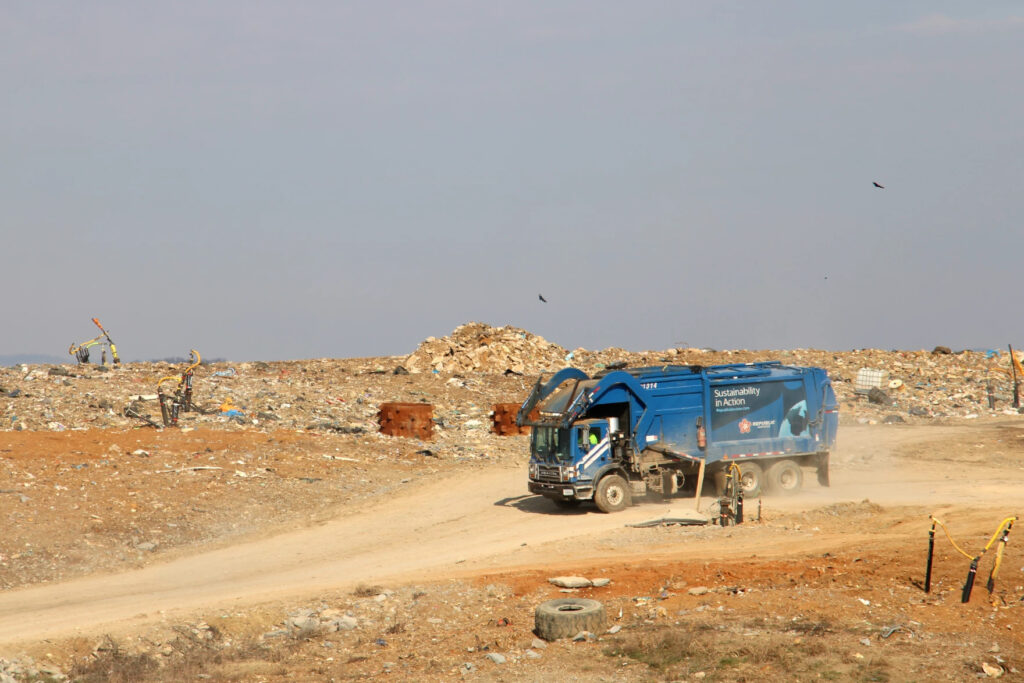
Every year, Tennessee sends nearly one million tons of recyclable materials worth $150 million to its landfills, contributing to a growing waste crisis. One state lawmaker is turning to a solution that’s been used in Europe since the 1990s: Extended Producer Responsibility, or EPR.
It would shift the cost of recycling programs from taxpayers to the companies that produce the waste. And with half of the landfills across the state rapidly approaching capacity, including Middle Point Landfill in Murfreesboro, the need for action is urgent.
Middle Point is the largest landfill in the state. It was first opened in 1989, but with rapid growth in Middle Tennessee it now takes in more than 1,000 tons of waste every day from Nashville and surrounding areas. And unless something changes, it’s slated to close in just four years. Regional Operator Mike Classen says that’s when it will run out of room.
“And in landfill terms, four years is zero years, because it takes probably two years to permit a new landfill, and then it takes another two years to build,” Classen said. “So time is of the essence here, certainly in Rutherford County, but really in Middle Tennessee more broadly, to really figure out a solution to our disposal capacity crisis.”
Middle Point isn’t the only site facing closure – more than half of the active landfills in the state will reach capacity in 20 years or less. When that happens, the local businesses and households that rely on them will be forced to ship their garbage elsewhere.
“If you don’t have a landfill and you have to ship that waste, you know 90, 100, 120 miles away, the cost to those businesses, which will then be passed on to consumers, is astronomical,” Classen said.
One potential solution: reduce waste. Tennessee is ranked 48th in the nation for recycling, and landfills nearly 1 million tons of recyclable materials each year.
“If we can landfill less and recycle more, that’s good for everybody,” Classen said. “But we’re going to follow what the market demands. And so what that really requires is some leadership from our elected officials to stand up and say, ‘Hey, we as elected officials are going to move our community in the direction of modern waste management recycling systems.’”
State Senator Heidi Campbell, a Democrat of Davidson County, sponsors the Tennessee Waste to Jobs Act, a business-focused approach to EPR.
“What’s different about this is that we’re trying to do this in a red state,” Campbell said. “And so we’re trying to basically find a more creative way that works for a red state … by actually centering business.”
By charging businesses a small fee per sold item based on package size and material, the state can encourage waste reduction and fund recycling infrastructure through a new non-profit. Then, recycling and reselling those materials back to producers generates profit for producers and consumers.
Gary Cohen is an EPR advocate who’s been meeting with legislators across the state. He uses M&M’s as an example:
“This is a bag of M&M’s, and the M&M’s are packaged in packaging,” Cohen said. “So what this bill does is it will transfer the cost of recycling this material and this packaging from the taxpayer to M&Ms – to Mars. And by the way, Mars is behind our bill, and they want their packaging back.”
Cohen says that companies such as Mars, Unilever, Nestle, and Danone already support the law. More recycling provides businesses with affordable, sustainable materials for production.
“We have plastic manufacturers who want the yogurt containers,” Cohen said. “We’re throwing away 88% to 90% of our plastic, you know, into the landfill. But these guys could use it to make paint cans.”
And according to Cohen, investing in recycling infrastructure would create more than seven-thousand jobs statewide. And it would all be funded by businesses – not taxpayers.
“We’re helping Tennessee and we’re building jobs,” Cohen said. “I mean, that’s why we changed the name to ‘Tennessee Waste to Jobs.’ We are bringing economic development through policy to Tennessee.”
Cohen stressed that the program would only apply to companies with at least $2 million in annual revenue, so small local businesses won’t be impacted.
But it’s not without opponents. According to Campbell, they’re meeting resistance from three distinct groups: the bottlers, the haulers and the grocers.
The ‘bottlers,’ companies like Coca-Cola and Pepsi, argue they already pay an almost 2% tax in the state on bottled drink sales. But only 0.4% of that tax revenue funds litter remediation.
“That’s why they’re against it, because they claim that they are already and have been doing their part for the past, you know, 90 years,” Cohen said. “So they don’t want to do more, and they don’t believe they should do more.”
The Beverage Association of Tennessee, which represents bottlers in the state, declined to comment when contacted about this issue.
If passed, Tennessee would be the first Republican-majority state to enact EPR legislation. Its fate remains uncertain, but both Campbell and Cohen remain optimistic.

